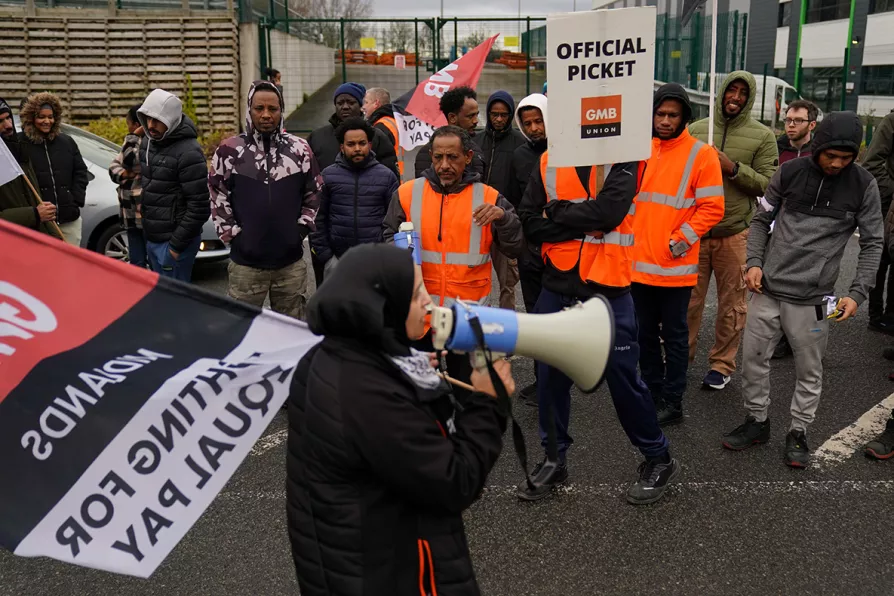
 Amazon staff members on a GMB union picket line outside the online retailer's site in Coventry, as they take part in a strike in their long-running dispute over pay, March 19, 2024
Amazon staff members on a GMB union picket line outside the online retailer's site in Coventry, as they take part in a strike in their long-running dispute over pay, March 19, 2024
THE recognition ballot at Amazon’s Coventry warehouse is the fruit of years of organising by some of Britain’s most exploited workers.
Officers of the GMB union entering the warehouse officially for the first time will be proud of shop-floor organisers who have taken on a global giant. But this is not a process that matters only to the GMB. The outcome will have implications for the future of trade unionism in Britain.
Profile matters. Like food workers’ union the BFAWU’s effort to organise McDonald’s workers, the campaign to unionise at Amazon resonates with millions, because Amazon like McDonald’s is a company of such size its practices set the tone for an entire sector.
Those practices are appalling: Amazon workers report constant surveillance, timed toilet breaks and enforcement of punishing work rates that lead to stress, exhaustion and even physical injury, something reflected in the startling number of ambulance callouts to its warehouses.
This super-exploitation has a corrosive effect across the deliveries sector, with attacks on pay and conditions to maximise profit Amazon-style creating an entire sector of precariously employed or bogusly self-employed couriers and inspiring attempts to break the workforce at Britain’s essential delivery service, Royal Mail, since its privatisation.
Amazon workers seeking to organise have faced all kinds of dirty tricks from bosses to stop them. A year ago GMB postponed its recognition bid when the company flooded its Coventry “fulfilment centre” with over 1,000 new recruits, simply to stop the union hitting the recognition threshold. In the past the company, a global player that fears unionisation at one plant could inspire workers everywhere, has closed entire sites rather than tolerate unionisation.
That fear tells us how important the Coventry workers’ victory can be. It could prompt a wave of unionisation among unorganised workers.
Trade unions in Britain have been in long-term decline since the end of the 1970s: their absolute membership has halved, and density among the workforce has dropped from over 50 per cent to under 23 per cent — and a mere 12 per cent in the private sector.
The strike wave of recent years is an opportunity to turn that around: victories on pay demonstrate the value of union membership and the huge increase in strikes has introduced unions to a new generation.
But wins have mainly been in already organised sectors: there has been no significant expansion of trade unions into parts of the economy which are largely unorganised, something essential if the decades of decline, linked to shifts in the composition of the working class through deindustrialisation, are to be brought to an end.
Much rests on our seizing this opportunity. Labour is not offering much for working-class voters. It won’t extend public ownership or increase public spending to fund wage rises that make up for 16 years of real-terms pay cuts.
The remaining case for a Labour vote rests heavily on the much diluted New Deal for Workers, particularly the promised abolition of recent anti-union laws and moves, though less ambitious than originally, to restore collective bargaining in some sectors.
That places the onus back on workplace organising. Britain’s great wage squeeze will not be ended by political but by industrial action, or by political action forced by industrial action.
The ability of unions to win pay rises in the private sector and to force higher pay offers from government in the public sector in 2022-23 showed this can be done, especially where industrial action is co-ordinated across unions, but low union density leaves a majority of the workforce disempowered and enables politicians to depict unions as sectional pressure groups rather than the collective voice of the working class that they can and must become.
Union recognition at Amazon’s Coventry plant, secured by the courage and sustained effort of the plant workers themselves, is a step to rectifying that.














